Introduction
Sustainable development stands for meeting the needs of present generations without harming future generations and their needs. The sustainable development approach contains a vision of progress integrating intermediate and long-run objectives, local and global activities, and considering the economic, social, and environmental issues. Sustainable development has economic, environmental and social dimensions, and is an overarching goal of the European Union. Competitiveness and sustainability are reinforcing concepts. Sustainable development is the common development strategy to exactly process and harmonize the mutual relationships among population, resource, environment, economy, and society for developed countries and developing countries in the 21st century (Zhou, 2009, Eurostat, 2007, Bopp, 2006). Sustainable development is a great challenge for societies: in times facing a global recession, financial crisis, climate change, and energy crisis it is increasingly important to follow a long-term strategy for further development to reach sustainability. Only an economy based on sustainability principles is able to secure prosperity and quality of life in the longer run. Corporate social responsibility refers to companies that voluntarily go beyond what the law requires in order to achieve social and environmental objectives during the course of their daily business activities. The European Commission encourages companies to apply fair employment practices that respect human rights, particularly where products come from outside the EU. This contribution provides an overview on the activities of the European Union on Corporate Social Responsibility, providing an evaluation of the impact of European Policy on CSR, emphasizing its multidimensional character and the role of public authorities and other stakeholders for a modern understanding of corporate social responsibility. In addition, the strategy 2011-2014 on corporate social responsibility, published by the European Commission in October 2011, as part of the Europe 2020 strategy, is analyzed, focusing on the main topics of the agenda, such as enhancing the visibility of CSR, improving and tracking the levels of trust in businesses, improving a self- and co-regulative process, and enhancing market reward for CSR. On a whole, the strategy aims to encourage companies to further increase their involvement in addressing employment and social issues within the 2020 strategy, which is one means of securing an exit from the current economic crisis.
Literature Review
In response to a growing environmental crisis and inequalities in global development, sustainable development was adopted as a leading concept by the international community in the 20th century. The term ‘sustainable development’ is often used in several ways and often with different connotations (Zaccaï 2002). It is a concept based on concept and defining principles. The term ‘sustainable’ can be used separated from ‘development’, for example as ‘sustainable agriculture’ or ‘sustainable business’. In this case the adjective refers to ‘sustainable development’ and ‘offers the possibility to integrate the concept’s fundamental principles into an array of application fields’ (Waas et al. 2011). The term ‘sustainability’ is often used as a synonym of ‘sustainable development’. Nevertheless, some scholars (such Gibson, Robinson or Dresner) distinguish between ‘sustainable development’ and ‘sustainability’, and assert that ‘sustainable development’ is primary about economic growth and development, whereas ‘sustainability’ focuses on the environment. ‘The commonality is that both terms take into account environmental considerations. The difference is that the former refers to “ameliorating” economic growth, taking into account the environment, whereas the latter is about “challenging” economic growth, focusing on the ability of humanity to live within the environmental limits of the planet. This debate remains unresolved regarding issues of “how” and even “whether” the terms differ ’ (Waas et al. 2011). Scholars, such as Lozano or Reid, ‘argue that sustainability stands for the “goal”, whereas sustainable development refers to the “process” to achieve it, but also this view is not consensual (Waas et al. 2011). Throughout this paper we will use the terms ‘sustainable development’ and ‘sustainability’ interchangeably, following the approach of the European Commission: The concept of sustainable development offers a vision of progress integrating immediate and longer term, as well as long-term objectives, local, national, and global measures and considering the economic, social, and environmental issues as interdependent components of human progress (European Commission Environment, 2010). Sustainable development cannot be brought about by policies only: it has to be taken up by the whole society as a principle guiding all the choices that each single citizen makes every day, as well as the overall economic and political decisions to be made. Such an approach requires changes in thinking, in economic and social structures, and in the area of production as well as consumption (European Commission Environment, 2010). According to Khoso et al. (2010) sustainable development in economics means the exploitation of the earth’s natural resources considering a process of conservation at the same time, which means the efficient use of resources while considering concepts such as renewability, reusability, and substitution. The concept of sustainable development stands for all forms and methods of socio-economic foundation of which the balance between socio-economic systems and natural potential has to be ensured, and lies in the three spheres of environment, which are society, economy, and issues such as climate change, population growth, rapid depletion of natural resources, and the risks for increasing poverty involve two or all of these spheres (Little and Green, 2009 & Aremu and Adeyemi, 2011). The need for humanity to live sustainably…to be a ‘sustainable world’ has roots dating back thousands of years in concerns expressed at the environmental damage humans cause (Clifton, 2010). A sustainable world is a concept based on different value systems, cultural contexts, and perceptions of reality (Gibbs and Krüger, 2005, Dobson, 1996). The term corporate social responsibility was first formalized by Bowen (1953), who argued that ‘it refers to the obligations of businessmen to pursue those politics, to make those decisions, or to follow those lines of actions which are desirable in terms of the objectives and values of society’ (Lombardo/D’Orio 2012). According to Lombardo and D’Orio (2012) a crucial development of the term corporate social responsibility can be seen in the work of Davis (1967), who included institutions and enterprises in the concept of CSR. ‘At a distance of some decades, although many scholars assume that there is an inherent compatibility of profit- making and fulfilling the needs of society, there is no consensus on the definition of CSR (Lombardo and D’Orio, 2012). According to the European Commission (2001), corporate social responsibility is ‘a concept whereby companies integrate social and environmental concerns in their business operations and in their interaction with their stakeholders on a voluntary basis’. In 2011 for the European Commission (2011f) ‘Corporate social responsibility concerns actions by companies over and above their legal obligations towards society and the environment. Certain regulatory create an environment more conducive to enterprises voluntarily meeting their social responsibility.’ The Commission now follows a broader approach than it did in 2001. ‘A strategic approach to CSR is increasingly important to the competitiveness of enterprises. It can bring benefits in terms of risk management, cost savings, access to capital, customer relationships, human resource management, and innovation capacity. Because CSR requires engagement with internal and external stakeholders, it enables enterprises to better anticipate and take advantage of fast changing societal expectations and operating conditions. It can therefore drive the development of new markets and create opportunities for growth. By addressing their social responsibility enterprises can build long-term employee, consumer and citizen trust as a basis for sustainable business models. Higher levels of trust in turn help to create an environment in which enterprises can innovate and grow.’ (European Commission 2011f).
Corporate Social Responsibility Activities within the European Union
‘The economic crisis and its social consequences have to some extent damaged consumer confidence and levels of trust in business. They have focused public attention on the social and ethical performance of enterprises. By renewing efforts to promote CSR now, the Commission aims to create conditions favourable to sustainable growth, responsible business behaviour and durable employment generation in the medium and long term.’ (European Commission 2011f). The Commission has played a pioneering role in the development of public policy to promote CSR. In 2006 the Commission published a new policy to support a business-lead initiative called the European Alliance for CSR and identified priority areas for EU action: awareness-raising and best practice exchange; support to multistakeholder initiatives; cooperation with Member States; consumer information and transparency; research; education; small and medium-sized enterprises; and the international dimension of CSR (European Commission 2011f). A modern definition for CSR, given by the European Commission (2011f) is defining it as ‘the responsibility of enterprises for their impacts on society”. Respect for applicable legislation, and for collective agreements between social partners, is a prerequisite for meeting that responsibility. To fully meet their corporate social responsibility, enterprises should have in place a process to integrate social, environmental, ethical, human rights and consumer concerns into their business operations and core strategy in close collaboration with their stakeholders. The Commission has identified factors that will help to further increase the impact of its CSR policy, including:
- ‘The need for a balanced multistakeholder approach that takes account of the views of enterprises, non-business stakeholders and Member States.
- The need to better clarify what is expected of enterprises, and to make the EU definition of CSR consistent with new and updated international principles and guidelines.
- The need to promote market reward for responsible business conduct, including through investment policy and public procurement.
- The need to consider self- and co-regulation schemes, which are an important means by which enterprises seek to meet their social responsibility.
- The need to address company transparency on social and environmental issues from the point of view of all stakeholders, including enterprises themselves.
- The need to give greater attention to human rights, which have become a significantly more prominent aspect of CSR.
- The need to acknowledge the role that complementary regulation plays in creating an environment more conducive to enterprises voluntarily meeting their social responsibility’ (European Commission 2011f).
In October 2011 the European Commission published a new policy on corporate social responsibility, which states that to fully meet their social responsibility, companies “should have in place a process to integrate social, environmental, ethical and human rights concerns into their business operations and core strategy in close collaboration with their stakeholders” (European Commission 2011f). The aim is both to enhance positive and to minimize and prevent negative impacts. Actions defined in the strategy address the following areas:
- ‘Enhancing the visibility of CSR and disseminating good practices: this includes the creation of a European award, and the establishment of sector-based platforms for enterprises and stakeholders to make commitments and jointly monitor progress.
- Improving and tracking levels of trust in business: the Commission will launch a public debate on the role and potential of enterprises, and organise surveys on citizen trust in business.
- Improving self- and co-regulation processes: the Commission proposes to develop a short protocol to guide the development of future self- and co-regulation initiatives.
- Enhancing market reward for CSR: this means leveraging EU policies in the fields of consumption, investment and public procurement in order to promote market reward for responsible business conduct.
- Improving company disclosure of social and environmental information: the new policy confirms the Commission’s intention to bring forward a new legislative proposal on this issue.
- Further integrating CSR into education, training and research: the Commission will provide further support for education and training in the field of CSR, and explore opportunities for funding more research.
- Emphasizing the importance of national and sub-national CSR policies: the Commission invites EU Member States to present or update their own plans for the promotion of CSR by mid 2012.
For companies seeking a formal approach to CSR, especially large companies, authoritative guidance is provided by internationally recognized principles and guidelines, representing an evolving and recently strengthened global framework for CSR. European policy to promote CSR should be made fully consistent with this framework. ‘According to these principles and guidelines, CSR at least covers human rights, labour and employment practices (such as training, diversity, gender equality and employee health and well-being), environmental issues (such as biodiversity, climate change, resource efficiency, life-cycle assessment and pollution prevention), and combating bribery and corruption. Community involvement and development, the integration of disabled persons, and consumer interests, including privacy, are also part of the CSR agenda. The promotion of social and environmental responsibility through the supply-chain, and the disclosure of non-financial information, are recognised as important cross-cutting issues. The Commission has adopted a communication on EU policies and volunteering in which it acknowledges employee volunteering as an expression of CSR’, emphasizing the multidimensional character of CSR. (European Commission 2011f). The development of CSR should be led by enterprises themselves. Public authorities should play a supporting role through a smart mix of voluntary policy measures and, where necessary, complementary regulation, for example to promote transparency, create market incentives for responsible business conduct, and ensure corporate accountability. Companies must be given the flexibility to innovate and to develop an approach to CSR that is appropriate to their circumstances. A report on the implementation of this action agenda should be published in time for a review meeting scheduled for mid 2014. By disclosing environmental, social, and governance information, companies often find that they can better identify and manage issues that influence their business success. A good disclosure of non-financial information enables investors to contribute to a more efficient allocation of capital and better achieve longer-term investment goals and it can help to make companies more accountable and contribute to higher levels of citizen trust in business (European Commission 2012)
European Law
European law makes in Directive 2003/51/EC the following requirement on companies. ‘To the extent necessary for an understanding of the company’s development, performance or position, the analysis [in the annual review] shall include both financial and, where appropriate, non-financial key performance indicators relevant to the particular business, including information relating to environmental and employee matters’ (European Commission 2003). Member States can choose to exempt small and medium-sized companies from this requirement. ‘The annual report (of companies) shall include at least a fair review of the development and performance of the company’s business and of its position, together with a description of the principal risks and uncertainties that it faces. The review shall be a balanced and comprehensive analysis of the development and performance of the company’s business and of its position, consistent with the size and complexity of the business; To the extent necessary for an understanding of the company’s development, performance or position, the analysis shall include both financial and, where appropriate, non-financial key performance indicators relevant to the particular business, including information relating to environmental and employee matters’ (European Commission 2003). The European Commission has made a commitment to ‘present a legislative proposal on the transparency of the social and environmental information provided by companies in all sectors’ (Single Market Act, SEC(2011)467). An impact assessment is currently ongoing to analyse different options. The Commission established an expert group to provide inputs to the impact assessment. The Expert Group on Disclosure of Non-Financial information by EU Companies has been established with the specific mandate to provide expert advice to the Commission in the context of the Impact Assessment currently being prepared by the Commission services. Among other things, the following basic questions should be answered by the expert groups involved in the assessment: Could a principle-based international reference framework for reporting on CSR at EU level improve comparability and relevance of CSR reporting? What would be the consequences of the adoption of more detailed reporting requirements (i.e. Key Performance Indicators) at EU level? An EU framework on non-financial reporting should leave appropriate flexibility for companies to decide the topics to report on and the metrics to be used. Experts agreed than any undue administrative burden should be avoided (European Commission 2011a,b). To decide on an existing framework or develop a new one experts had to address main summarized in table 1.
Table 1: Expert Questions on Framework Options
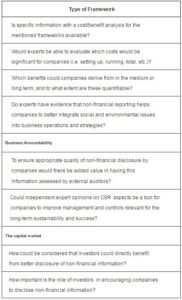
The Expert Group has discussed a number of general issues, including the scope and nature of a potential mandatory requirement, the principles and topics that a non-financial report should be based on, as well as the role and impact that mandatory disclosure of non-financial information might have on the accountability of business, company performance and capital markets. The Commission services are considering whether a disclosure requirement should take the form of a general reporting obligation, or rather be translated into a “comply or explain” approach. The outcome of the expert group and European Commission services meetings is summarized in table 2 (European Commission 2011c). A legislative proposal on the disclosure of non-financial information by companies is planned for the first half of 2012.
Table 2: Analysis Results of the Expert Group and European Commission Services
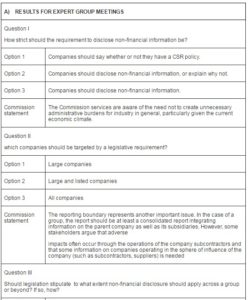
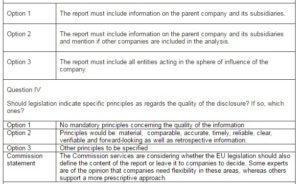
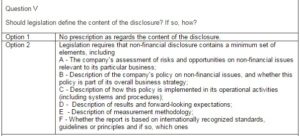
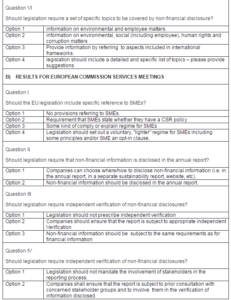
Public Consultation on Non-Financial Reporting
Between 2009 and 2010 the services of the European Commission hosted informal workshops that examined the disclosure of non-financial information from the perspective of different stakeholders, supporting the work of the European Alliance on Corporate Social Responsibility. The EU 2020 Agenda (sustainable growth and jobs) promotes the renewal of CSR. In 2010 the European Commission launched an online public consultation to gather views on the disclosure of non-financial information by enterprises. Until 2011 A total of 259 responses were received from interested stakeholders: preparer (non-financial companies, organization of companies or financial institutions, other), user (analyst, investor/investor organization, non-government organizations/other organizations of stakeholders, trade union, private person/customer) , public authority (audit/market regulator, government ministry/agency, other), accountants and auditors (accounting/audit firm, association of accountants and auditors). Table 3 shows main questions of the questionnaire designed for that public consultation (European Commission 2011d).
Table 3: Questionnaire
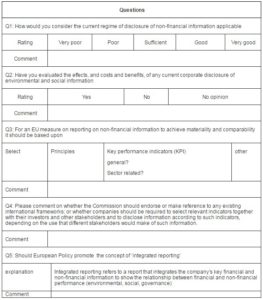
‘About half of the responses were received by companies/preparers and users of accounts, whereas the remaining contributions were split amongst NGOs and other organizations, Accountants and Auditors, Public Authorities and Standard Setters, and other contributors including individuals and academics. More than half of the contributions came from three Member States (DE, FR and UK), while the remaining responses were split amongst other Member States (AT, BE, CS, CY, DK, ES, FI, IE, IT, LU, NL, PL, SV) as well as EU-wide, international or Third Countries organizations from Colombia, Israel, Japan, Mexico, New Zealand, Norway, Switzerland and USA’. (European Commission 2011e).
Discussion
‘Corporate Social Responsibility looks different from country to country. In some EU Member states the concept is established and there is a high level of company awareness supported by effective public policies to promote CSR. In other European countries, the awareness and development of corporate social responsibility is much less advanced’ (European Commission 2011f). In 2011 the European Commission published a compendium of public CSR policies in the EU which gives an overview of public policies on CSR in the 27 EU Member States and the European Union. ‘A strategic approach to corporate social responsibility is increasingly important to the competitiveness of companies. It can bring benefits in terms of risk management, cost savings, access to capital, customer relationships, human resource management, and innovation capacity. Because CSR requires engagement with internal and external stakeholders, it enables enterprises to better anticipate and take advantage of fast changing societal expectations and operating conditions. It can therefore drive the development of new markets and create opportunities for growth. The European Commission has identified three areas of European policy that can be leveraged to strengthen the market reward for responsible business conduct:
- Consumption: the revision of the Sustainable Consumption and Production Action Plan may provide an opportunity to identify new measures to facilitate more responsible consumption practices.
- Public procurement: in its review of the Public Procurement Directives, the Commission intends to facilitate the better integration of social and environmental considerations into public procurement.
- Investment: the Commission will consider a requirement on all investors to inform their clients about ant ethical or responsible investment criteria they apply.
‘For corporate social responsibility reporting the European Commission has made a commitment to present a legislative proposal on the transparency of the social and environmental information provided by companies in all sectors. An impact assessment is currently ongoing to analyse different options. The Commission established an expert group to provide inputs to the impact assessment’ (European Commission 2011f).Till 2010 the European Commission hosted a series of multi-stakeholder workshops on the disclosure of environmental, social and governance information and launched an online public consultation to gather views on the disclosure of non-financial information by companies.
The Survey: Results (European Commission 2011e)
Question Q1 ( How would you consider the current regime of disclosure of non-financial information applicable): ‘Roughly half of the respondents considered the current regime as ‘at least sufficient’ while the other half considered it as “poor/very poor”. Respondents broadly indicated that the legal regimes are significantly different across Member States and opinions therefore varied. Due to the lack of a common framework ensuring an adequate level of comparability many respondents found it complicated to make an assessment of companies operating in the EU.’
Analyzing the results to Q1 we recommend that the European Commission should focus on the development of a legal framework of disclosure of non-financial information on an member-wide level. The framework should be mandatory in all member countries, so that companies operating EU wide are not faced with the problem to consider complex legal frameworks, different in selected countries they are operating in.
Question Q2 (Evaluation of effects, and costs and benefits, of any current corporate disclosure of environmental and social information): ‘Most respondents considered the assessment of costs and benefits of corporate reporting of non-financial information as important, with about half of the contributors stating that they have done some research, or analysis, or that they have assessed the research conducted by third parties. Although many stakeholders were not able to quantify costs and benefits, a significant number of contributors provided a qualitative analysis related to mandatory disclosure. As far as costs are concerned, data collection, internal processing and consolidation, staff training/education, development of specific tools and potential third party verification were quoted amongst the main factors that might cause significant administrative burden. On the benefits side, positive effects relating to increased transparency, reputation, branding, global competitiveness, credibility, and generally increased attractiveness for both consumers and investors were highlighted in a significant number of contributions. A relevant number of stakeholders also pointed out that the costs, although potentially quite significant, would most likely be outweighed by the potential benefits’.
Analyzing the results to Q2 we recommend that the European Commission support companies in their research on cost and benefit development for any current corporate disclosure of environmental and social information. Supporting third party research and making the results of this research available for all companies and promoting this availability could decrease the administrative burden for companies, because they do not need to do topic related research on their own, can source third party conducted analysis results, and benefit from these research approaches. It could be the role of the European Commission to support EU wide third party research, to promote the availability of research results among member countries and to force the member country wide structured exchange for research results. Additionally, there could be defined a structure on country level, how companies could access these research results. For companies operating in more than one member country, structured should be offered to gather industry related information for all countries they are working in.
Question Q3 (EU measures on reporting on non-financial information to achieve materiality and comparability): ‘A majority of respondents agree that information relating to all the aspects mentioned in the question (i.e. whether or not a company has a CSR policy, the principle business risks and opportunities as well as key information on certain issues) was relevant and should be disclosed. While some respondents did not see the need to introduce more extensive requirements, at least in the short or medium term, others indicated that non-financial reporting would enable companies to “tell their story” by disclosing their core business model, strategy and key business risks. This would provide a certain degree of flexibility for companies to disclose information that they consider relevant.’
Analyzing the results to Q3 we recommend that the European Commission starts a programme to inform companies about main issues, advantages and possible challenges of including non-financial issues in their reporting. A majority of companies agree that there is a need for disclosing such information, but the potential administrative burden harms them doing the first steps for disclosing non-financial topics. With the help of the proposed program companies should be encouraged including non-financial topics, why getting information about short-tem and long-term challenges and should get guidelines for starting and managing their efforts on disclosure. The trend from Q3 indicated that companies know there is a need for disclosure but actions from companies’ side are not continuously taken. With the proposed program and guidelines for companies, as a whole package, disclosure activities could be started and directed.
Question Q4 (Selection of a framework): Respondents generally considered that there was value in reporting on non-financial aspects based on both overall principles as well as key performance indicators (KPIs) and indicated that both could co-exist in a future EU approach, with no clear consensus for one option or the other. Many respondents stated that a set of key performance indicators could be universally applied to all companies and sectors, while others favoured a system of sector-specific indicators.’
Analyzing the results to Q4 the European Union should decide on which kind of framework has to be used, an universally applied one for all sectors or industry-based frameworks. To be able to decide on, the European Commission has to find out how an universally applied framework would fit for all companies. Using industry samples (representative companies from different industries) the European Union could examine how an universal framework could be applied and analyze the results, evaluating challenges and limitations. Based on this analysis it should be analyzed how limitations of an universally applied framework could be overcome without defining industry-based (sub)frameworks. In case the framework could include flexible part, which could be adopted by companies, and this could support them to overcome the limitations of the basic framework, there would be no need to differentiate between industries. In case they could not overcome limitations, indicated before, industry-based frameworks are an option to follow. Apart from this, it should be considered if in these flexible parts also country related issues should be included or if all frameworks (member country-wide) can be designed in the same way. In general, the more (sub) frameworks are defined, the more complicated it would be in the longer run to compare results on company level. Therefore the European Commission should follow the KISS approach, and keep it small and simple.
Question Q5 (Integrated reporting): ‘Respondents were generally supportive of the integrated reporting concept, regardless of the group, and mentioned it should be supported in EU policy, particularly as a medium-term approach. Nevertheless, other respondents were more hesitant, indicating that a significant development effort is still necessary before considering mainstream use of integrated reporting. A number of respondents firmly questioned the feasibility of integrated reporting in the short term, the most commonly expressed concerns being that coordinating financial and non-financial reporting could lead to an information overload, or a sub-optimal amount of information. It was also argued that specific target audience of a separate CSR report may be lost in integrated reporting, and that it would be an onerous and costly process.’
Analyzing the results to Q5 the European Commission has to answer the following questions: (1) How can integrated reported be supported in a medium-term approach? (2) How can the development of an integrated reported be organized, minimizing the administrative burden for member countries and single companies? (3) Is the installation of an integrated reporting feasible in the short term? (4) Is there the threat of an information overload for addresses of the reports, because financial and non-financial information is provided in one report? (4a) If yes, how can this information overload be avoided? (4b) How can an optimal level of information be defined and which company related parameters have to be considered? (5) How is the cost structure for the integration process? Answering all these questions could show the European Commission how to focus on what and to be able to decide about the scope of integrated reporting for companies.
Conclusion
The European Commission was a pioneer in developing a public policy to promote corporate social responsibility, defining in their ‚European Alliance’ (2006) the support of multistakeholder CSR initiatives, research and education on CSR, and the support of small and medium-sized companies in their CSR activities, as priority areas for the European Union to focus on, accompanied by an applicable legislation and collective agreements between social partners. With it’s new strategy on CSR (2011) the European Commission emphasized the need for the establishment of sector-based platforms for enterprises and stakeholders to make commitments and jointly monitor progress, the improvement and tracking of levels of trust in businesses, the creation of guidelines for the development of future self- and co-regulation initiatives and the improvement of company disclosure of social and environmental information. For companies seeking a formal approach to CSR, especially large companies, authoritative guidance is provided by internationally recognized principles and guidelines, representing an evolving and recently strengthened global framework for CSR. The European Commission has made a commitment to ‘present a legislative proposal on the transparency of the social and environmental information provided by companies in all sectors’, an impact analysis is currently ongoing. The Commission considers whether a disclosure requirement should take the form of a general reporting obligation, or rather be translated into a “comply or explain” approach. A legislative proposal on the disclosure of non-financial information by companies is planned for 2012. Corporate Social Responsibility looks different in member countries, with a concept, establishing a high level of company awareness supported by effective public policies to promote CSR. Till 2010 the European Commission hosted a series of multi-stakeholder workshops on the disclosure of environmental, social and governance information and launched an online public consultation to gather views on the disclosure of non-financial information by companies. The results of these activities were analyzed in this contribution.
(adsbygoogle = window.adsbygoogle || []).push({});
References
Aremu, M. A. & Adeyemi, S. L. (2011). “Small and Medium Scale Enterprises as A Survival Strategy for Employment Generation in Nigeria,” Journal of Sustainable Development, 4(1), 2011, 200-206.
Publisher – Google Scholar
Bopp, M. & Bopp, J. (2006). Recreating the World: A Practical Guide to Building Sustainable Communities. Cochrane AB: Four Worlds Press.
Publisher
Bowen, H. (1953). ‘Social Responsibility of the Businessman,’ Harper and Row, New York.
Google Scholar
Clifton, D. (2010). “Progressing a Sustainable-World: A Socio-Ecological Resilience Perspective,” Journal of Sustainable Development, 3(4), 2010, 74-96.
Publisher – Google Scholar
Davis, K. (1967). “Understanding the Social Responsibility Puzzle: What Does the Businessman Owe to Society?,”Business Horizons, Vol. 10, No. 4, 1967, 45-50.
Publisher – Google Scholar
Dobson, A. (1996). “Environmental Sustainabilities: An Analysis and a Typology,” Environmental Politics, 5(3),401-428.
Publisher – Google Scholar – British Library Direct
Dresner, S. (2008). The Principles of Sustainability, 2nd Ed.; Earthscan: London, UK.
Publisher – Google Scholar
European Commission (2001). ‘Promoting a European Framework for Corporate Social Responsibility,’ green paper, EMCC, Dublin.
Google Scholar
European Commission (2003). Directive 2003/51/EC of the European Parliament and of the Council of 18 June 2003 amending Directives 78/660/EEC, 83/349/EEC, 86/635/EEC and 91/674/EEC on the Annual and Consolidated Accounts of Certain Types of Companies, Banks and Other Financial Institutions and Insurance Undertakings. Directive 2003/51/EC. [Retrieved April 11, 2012], URL: http://eur-lex.europa.eu/LexUriServ/LexUriServ.do?uri=OJ:L:2003:178:0016:0022:en:PDF
Publisher
European Commission (2011). Communications from the Commission to the European Parliamant, the Council, the European Economic and Social Committee and the Committee of the Regions ‘A renewed EU strategy 2011-14 for Corporate Social Responsibility’ COM(2011) 618 final.
European Commission (2011a). Directorate General Internal Markets and Services. Capital and Companies. Accounting and financial reporting. Expert group on disclosure of non-financial information by EU Companies. Meeting minutes, July 11, 2011. [Retrieved April 11, 2012], URL: http://ec.europa.eu/enterprise/policies/sustainable-business/files/reporting-disclosure/1st_meeting_minutes_en.pdf
Publisher
European Commission (2011b). Directorate General Internal Markets and Services. Capital and Companies. Accounting and financial reporting. Expert group on disclosure of non-financial information by EU Companies. Meeting report, September 12, 2011. [Retrieved April 11, 2012], URL:http://ec.europa.eu/enterprise/policies/sustainable-business/files/reporting-disclosure/2nd_meeting_minutes_en.pdf
Publisher
European Commission (2011c). Directorate General Internal Markets and Services. Capital and Companies. Accounting and financial reporting. Expert group on disclosure of non-financial information by EU Companies. Meeting report, September 30, 2011. [Retrieved May 16, 2012], URL:http://ec.europa.eu/enterprise/policies/sustainable-business/files/reporting-disclosure/2nd_meeting_minutes_en.pdf
Publisher
European Commission (2011d). Directorate General Internal Markets and Services. Public Consultation on Disclosure of Non-Financial Information by companies. Questionnaire. [Retrieved April 11, 2012], URL:http://ec.europa.eu/internal_market/consultations/docs/2010/non-financial_reporting/overview_en.pdf
Publisher
European Commission (2011e). Internal Market and Services DG. Free Movement of Capital, Company Law and Corporate Governance. Summary Report of the responses received to the Public Consultation on Disclosure of non-financial Information by Companies, April 2011, [Retrieved May 11, 2012], URL:http://ec.europa.eu/internal_market/consultations/docs/2010/non-financial_reporting/summary_report_en.pdf
Publisher
European Commission (2011f). Communication from the Commission to the European Parliament, the Council, the European Economic and Social Committee and the Committee of the Regions. A Renewed EU Strategy 2011-14 for Corporate Social Responsibility, October 2011, COM(2011) 681 final, [Retrieved May 11, 2012], URL:http://ec.europa.eu/enterprise/policies/sustainable-business/files/csr/new-csr/act_en.pdf
Publisher
European Commission (2012). Sustainable and Responsible Business. Corporate Social Responsibility (CSR). [Retrieved May 11, 2012], URL:http://ec.europa.eu/enterprise/policies/sustainable-business/corporate-social-responsibility/index_en.htm
Publisher
European Commission Environment (2010). [Online], [Retrieved May 11, 2012], URL: http://ec.europa.eu/environment/eussd/
Publisher
Eurostat (2007). Measuring Progress towards a More Sustainable. Monitoring report. EU Sustainable Development Report. Brussels.
Publisher
Gibbs, D. & Krueger, R. (2005). “Exploring Local Capacities for Sustainable Development,” Geoforum, 36(4), 407-409.
Publisher – Google Scholar
Gibson, R. (2000). Specification of Sustainability-Based Environmental Assessment Decision Criteria and Implications For Determining “Significance” in Environmental Assessment; Canadian Environmental Assessment Agency—Research and Development Monograph Series: Quebec, Canada.
Publisher
Khoso, I., Ram, N., Mehmood, B., Shaikh, F. M. & Shafiq, K. (2010). “Sustainability: Its Changing Paradigm and Rural Development in Sindh,” Journal of Sustainable Development, 3(4), 2010, 252-255.
Publisher – Google Scholar
Little, A. W. & Green A. (2009). “Successful Globalization, Education and Sustainable Development,” International Journal of Educational Development, 29, 166-174.
Publisher – Google Scholar
Lombardo, R. & D’Orio, G. (2012). “Corporate and State Social Responsibility: A Long-Term Perspective,” Modern Economy, 2012, 3, 91-99.
Publisher – Google Scholar
Lozano, R. (2008). “Envisioning sustainability three-dimensionally,” J. Clean. Prod. 2008, 16, 1838-1846.
Publisher – Google Scholar
Reid, D. (2005). ‘Sustainable Development— An Introductory Guide,’ Earthscan: London, UK.
Robinson, J. (2004). “Squaring the Circle? Some Thoughts on the Idea of Sustainable Development,” Ecol. Econ.2004, 48, 369-384.
Publisher – Google Scholar
Waas, T. & Hugé, J. & Verbruggen, A. & Wright, T. (2011). “Sustainable Development: A Bird’s Eye View,” Sustainability3, 10: 1637-1661.
Publisher – Google Scholar
Zaccaï, E. (2002). Le Développment Durable. Dynamique et Constitution d’un Projet. Peter Lang: Bruxelles, Belgium.
Publisher
Zhou, S. (2009). “Study on the Management Factors of the Sustainable Development Environmental Governance Mechanism in Inner Mongolia,” Journal of Sustainable Development, 2(2), 2009, 168-172.
Publisher – Google Scholar








